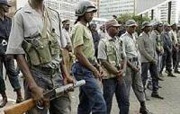
THE police have requested US$183 million ahead of a referendum and elections due later this year, raising questions whether this does not amount to commercialisation of the force.
BY OUR STAFF
Ironically, the request is only US$22 million less than what the country needs to run the whole electoral process, which is expected to cost US$205 million.
Even Home Affairs co-minister, Theresa Makone said she thought the budget was a bit steep and wondered how the police force had come up with that figure.
“It sounds like a lot of money,” she said. “I am yet to see a breakdown of how they came up with that figure.”
Makone said she was also worried that one government department, the police, was demanding so much money for the elections and what that would mean for the entire electoral process.
“The whole electoral process will cost US$200 million and then you have one department asking for US$183 million, that does not sound right,” she said.
The country is struggling to raise money for the referendum and national elections.
- Chamisa under fire over US$120K donation
- Mavhunga puts DeMbare into Chibuku quarterfinals
- Pension funds bet on Cabora Bassa oilfields
- Councils defy govt fire tender directive
Keep Reading
The government has already sent out a distress signal to the United Nations Development Programme and the private sector to bankroll the two electoral processes.
The government only set aside US$100 million for elections, enough to cover the referendum.
But police spokesperson, Charity Charamba defended the police budget, saying since the inception of the coalition government four years ago, there had been scant financing of police operations.
“At the same time [you] . . . ought to understand that [the] police operate from government funding, we do not have any other source of funding,” she said in written responses. “For time immemorial, especially after the formation of [the] GNU, the police have continued to suffer perennial budget shortages.”
Charamba said the force required funding for elections, as what they had in their coffers was barely enough to cover their day-to-day costs.
“Policing elections is not regularly budgeted for, hence an extra budget is drawn to ensure effective and efficient managing of elections,” she continued.
However, Charamba declined to reveal the budget for elections, “due to security reasons and this is not for public consumption”.
The police spokesperson scoffed at suggestions that the force was being commercialised as evidenced by the rather high elections budget.
“Those proponents of the theory that police are commercialising should in fact appreciate that [the] police are strategic planners who plan ahead according to international best practices; we do not wait until election day,” she said.
“Those misinformed elements should also know that this is not the first time [the Zimbabwe Republic Police] ZRP has policed plebiscites of this nature, for example [in] 2008 a budget was also drawn. Remember ZRP is a patriotic organisation that wishes to see the best in a violent-free environment.”
Apart from money from government, the police also get money from fines they collect on a daily basis but do not remit to Treasury as required by law.
They are also paid to provide security at such events as soccer matches.











